Yitro
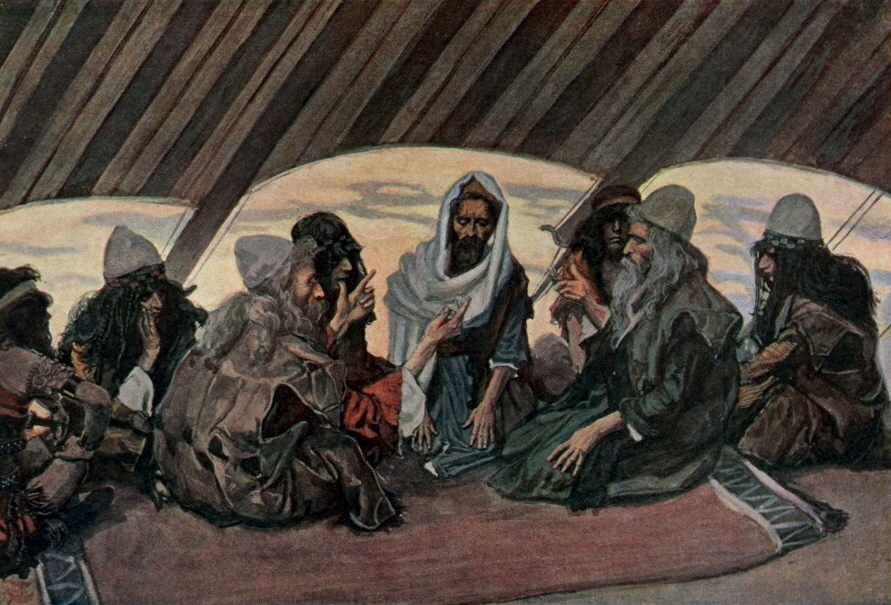
In a nutshell, Yitro (יִתְרוֹ), Mosheh’ father-in-law, and the pagan priest of Midian, the first convert, hearing of the great miracles which G‑d performed for the people of Israel, come from Midian to the Israelite camp, bringing with him Mosheh’ wife and two sons. Jethro advises Mosheh to appoint judges to assist him in the task of governing and administering justice to the people, delegating his responsibilities, with Mosheh presiding only over the most difficult cases. This would also free up Mosheh’ time to teach the Israelites the teachings of the Torah that he hears from G‑d. Mosheh and G-d’s revelation of the Ten Commandments to the Israelites at Mount Sinai. The children of Israel camp opposite Mount Sinai, where they are told that G‑d has chosen them to be His “holy nation.” The people respond by proclaiming, “All that G‑d has spoken, we shall do.”
Mount Sinai
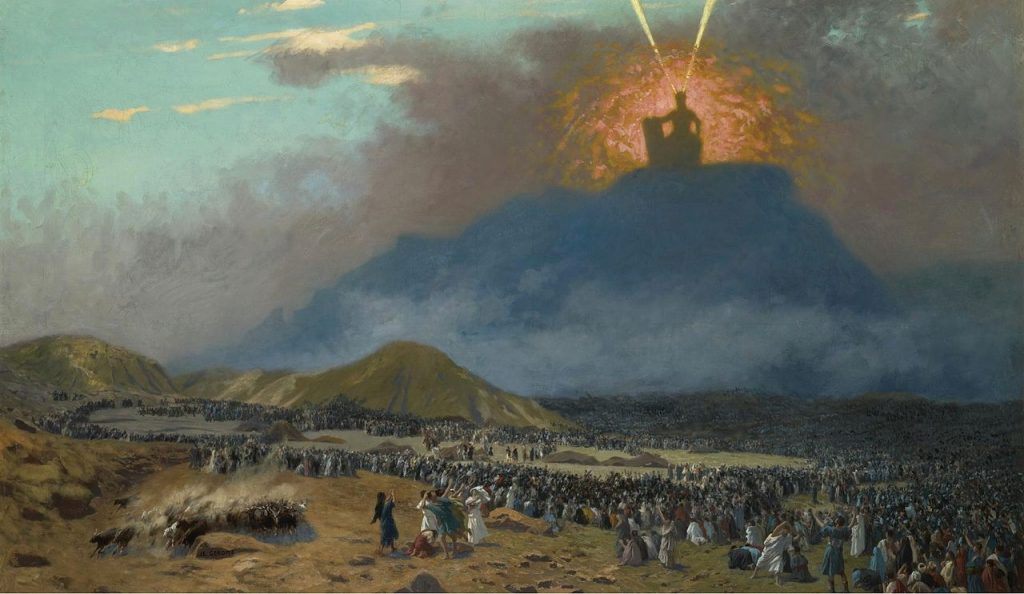
On the sixth day of the third month (Sivan), 49 days after having left Egypt and six days after they camped at the foot of Mount Sinai, the entire nation of Israel assembles at the foot of Mount Sinai for the Giving of the Torah . God speaks the Ten Commandments to the Children of Israel amidst fire, smoke, and the sound of the shofar, an overwhelming revelation, an awesome “light and sound” show, and summons Mosheh to ascend.
The Ten Commandments
The entire purpose of creation was to set the stage for the performance of mitzvahs, as represented by the Ten Commandments. The people cry out to Mosheh that the revelation is too intense for them to bear, begging him to receive the Torah from G‑d and share it with them. G-d speaks The 10 Commandments:
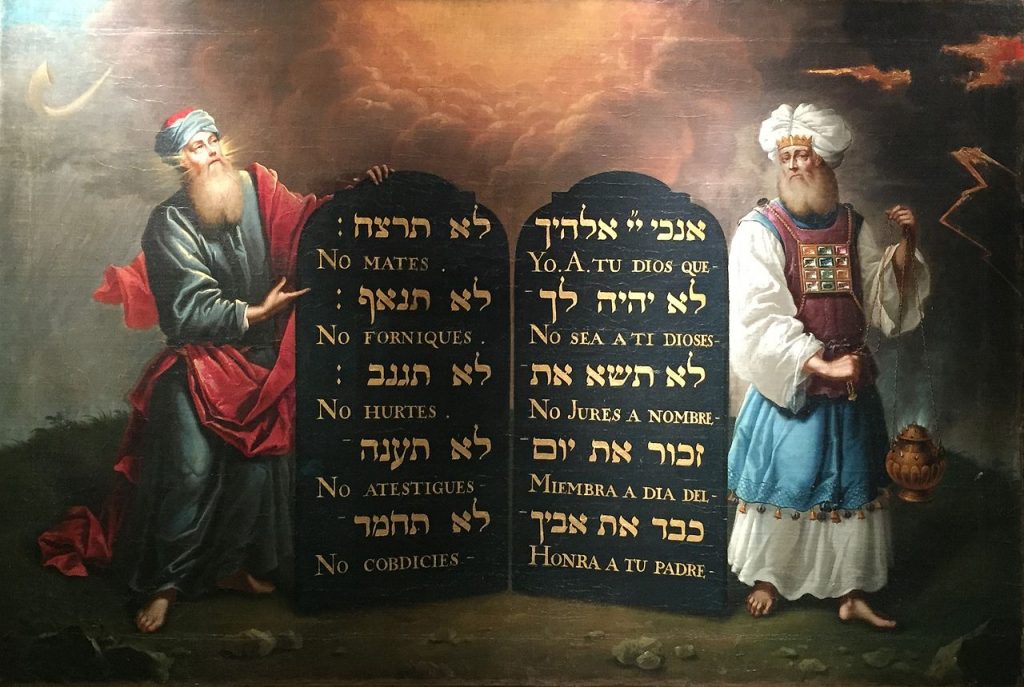
- Believe in G‑d.
- Not to worship idols.
- Not to take G‑d’s name in vain.
- Keep the Shabbat.
- Honor their parents.
- Not to murder.
- Not to commit adultery.
- Not to steal.
- Not to bear false witness.
- Not covet another’s wife or property.
The number 10
G‑d created the world with 10 words. There were 10 generations from Adam to Noah. 10 generations from Shem (Noah’s son) to Abvraham. The Israelites were saved from Egypt by 10 plagues, Accepting the 10 Commandments at Mount Sinai.
Yitro versus Va’etchanan
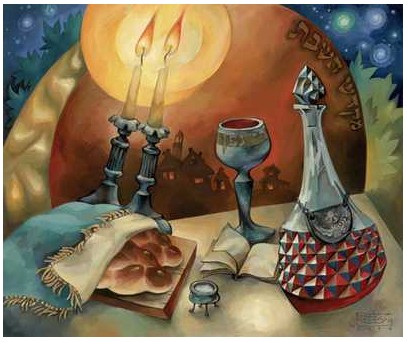
The Ten Commandments are read publicly three times a year, twice when it comes up in the weekly Torah reading (Exodus 20/ Yitro portion, and Deuteronomy 5/ Va’etchanan portion), and once again on the first day of the holiday of Shavuot. The Ten Commandments in Parashat Yitro and Parashat Va’etchanan are almost identical, however, the version in Deuteronomy is longer because Mosheh is retelling of the events, adding his insightful reflection of the 40 years journey. Another difference is in the fourth commandment. The Exodus version begins with “Remember the Shabbat” and the Deuteronomy version starts with “Keep the Shabbat.” The rabbis say that both are accurate. G‑d actually spoke the command to keep Shabbat (by desisting from forbidden work) and remember Shabbat (through declaring its sanctity)
B’simcha, be joyful
The Israelites needed to prepare for Matan Torah (The giving of the Torah) at Sinai. Rebbe Nachman tells us that Mosheh Rabbeinu was incredibly b’simcha (joyful) when he ascended Mount Sinai to receive the Torah. The Midrash (Tanchuma, Yitro #13) tells us that on the eve of the Torah-giving the entire Jewish people cheerfully looked forward to accepting the Torah.
The 49-day interval / Omer

On the first day of the month of Sivan in the year 2448 from creation (1313 BCE), six weeks after the Exodus, the people of Israel arrived at Mount Sinai. Six days later, the entire nation stood at the foot of the mountain as G‑d revealed Himself to them and gave them the Torah. The main purpose of having the Jews leave Egypt was that they will receive the Torah, however, there was a 49-day interval from Exodus to Matan Torah. The Midrash asks, why the delay? It answers that when the Jews left Egypt they were physically and emotionally broken people, thus unfit to be the receivers of G-d’s holy word. The 49-day interval from Exodus to Matan Torah gave them enough time to heal.
Ever since, we celebrate the festival of Shavuot (Sivan 6–7) as “The Time of the Giving of Our Torah.”
Rebbe Nachman
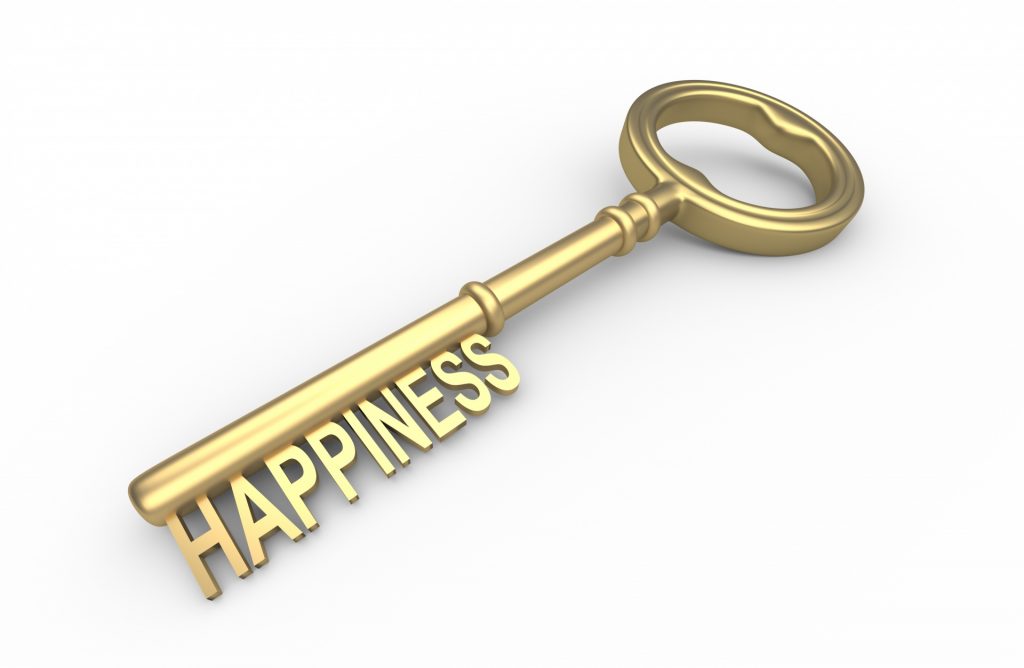
Happiness and health go together. Rebbe Nachman teaches, “If there is any sort of damage or flaw in (one’s) simcha, illness results” (Likutey Moharan II, Lesson #24). The Rebbe goes on to say that in the Future, the world’s simcha will be so great that there will be no illness at all.
Are you smiling?

Almost a year into social distancing, where loneliness seem to be the norm, the future is unknown, people live in fear and happiness can seem to contradict our external reality, where masks, also mask smiling faces, we have to do our best to remain happy.
Rabbi Nachman’s Secret of Happiness
“But what is the antidote for the person who feels so heavy, so depressed, that no words of encouragement or advice have any effect?” The lesson is best illustrated by the following story “The poor man and the Diamond” Rabbi Nachman told to his disciples:
The Poor Man and the Diamond

There was once a poor man who earned a living digging clay and selling it. Once, while digging clay, he discovered a precious stone which was obviously worth a great deal. Since he had no idea of it’s worth, he took it to an expert to tell him Its value. The expert answered, “No one here will be able to afford such a stone. Go to London, the capital, and there you will be able to sell it.” The man was so poor that he could not afford to make the journey. He sold everything he had, and went from house to house, collecting funds for the trip. Finally he had enough to take him as far as the sea.
He then went to board a ship, but he did not have any money. He went to the ship’s captain and showed him the jewel. The captain immediately welcomed him aboard the ship with great honor, assuming he was a very trustworthy person. He gave the poor man a special first class cabin, and treated him like a wealthy personage. The poor man’s cabin had a view of the sea, and he sat there, constantly looking at the diamond and rejoicing. He was especially particular to do this during his meals, since eating in good spirits is highly beneficial for digestion. Then one day, he sat down to eat, with the diamond lying in front of him on the table where he could enjoy it. Sifting there he dozed off. Meanwhile, the mess boy came and cleared the table, shaking the tablecloth with it’s crumbs and the diamond into the sea. When he woke up and realized what had happened, he almost went mad with grief. Besides, the captain was a ruthless man who would not hesitate to kill him for his fare. Having no other choice, he continued to act happy, as if nothing had happened. The captain would usually speak to him a few hours every day, and on this day, he put himself in good spirits, so that the captain was not aware that anything was wrong. The captain said to him, “I want to buy a large quantity of wheat and I will be able to Sell it in London for a huge profit. But I am afraid that I will be accused of stealing from the king’s treasury. Therefore, I will arrange for the wheat to be bought in your name. I will pay you well for your trouble.” The poor man agreed. But as soon as they arrived in London the captain died. The entire shipload of wheat was in the poor man’s name and it was worth many times as much as the diamond.

Rabbi Nachman concluded, “The diamond did not belong to the poor man, and the proof is that he did not keep it. The wheat, however, did belong to him, and the proof is that he kept it. But he got what he deserved only because he remained happy.”
“It is up to us, to never lose hope, and like the poor man in the story to whom everything appeared lost, he had to force himself to be happy. Even a faked happiness, has the power to transform our situation and lead us to genuine joy.” (Breslav-Rabbi Nasan Maimon)
Happiness

How happy are we to be getting the Torah? Matan Torah happens every day, as we may choose to remain prepared, and to study Torah on a daily basis. The Baal Shem Tov said that a part of his mission in life was to do away with the byzeneh lamdan (irritable Torah learner). You can’t do all of the mitzvaot all of the time. But you can do some mitzvot some of the time. Do the best you can. Be b’simcha that you’ve been chosen to receive the Torah and to live by the mitzvot. Be b’simcha, (be happy) whenever you do a mitzvah. In Psalm 96 it says “The Heavens Shall be Glad, The Sea in It’s Fullness Roars”. Do a mitzvah, Don’t worry, Be happy and stay healthy. Kol Tuv.
Check out YedidYah Psalm 96 “Yiram Hayam” Music by Rabbi Yakira Yedidia https://youtu.be/aTBD4i9nvXw
The 613 Mitzvot
In The Torah there are 613 commandments, mitzvot, also known as the Law of Moses (תרי״ג מצוות, taryag mitzvot). The 613 mitzvot are first recorded in the 3rd century CE, when Rabbi Simlai mentioned it in a sermon that is recorded in Talmud Makkot 23b.
The 613 commandments include 248 “positive commandments”, to perform an act (mitzvot aseh), and 365 “negative commandments”, to abstain from certain acts (mitzvot lo taaseh). The negative commandments number 365, which coincides with the number of days in the solar year, and the positive commandments number 248, a number ascribed to the number of bones and main organs in the human body.
Though the number 613 is mentioned in the Talmud, its real significance increased in later medieval rabbinic literature, including many works listing or arranged by the mitzvot. The most famous of these was an enumeration of the 613 commandments by Maimonides, The Rambam.
Many of the mitzvot cannot be observed now, following the destruction of the Second Temple, although they still retain religious significance. According to one standard reckoning, there are 77 positive and 194 negative commandments that can be observed today, of which there are 26 commands that apply only within the Land of Israel. Furthermore, there are some time-related commandments from which women are exempt (examples include shofar, sukkah, lulav, tzitzit and tefillin). Some depend on the special status of a person in Judaism (such as kohanim), while others apply only to men or only to women.
According to Rambam Organized by Parsha. based on Wikipedia and http://www.vaadrv.org/rambam613mitzvot.asp ONE BIG IMPORTANT NOTE WHEN USING THIS LISTING: This listing is not all inclusive. Rambam may site multiple sources for a mitzvah is his works but this list currently only gives one source for each mitzvah.
The 16 Mitzvot in Parashat Yitro
- To know there is a God Ex. 20:2
- Not to entertain thoughts of other gods besides Him Ex. 20:3
- Not to make an idol for yourself Ex. 20:4
- Not to worship idols in the manner they are worshiped Ex. 20:5
- Not to worship idols in the four ways we worship God Ex. 20:5
- Not to take God’s Name in vain Ex. 20:6
- To sanctify the day with Kiddush and Havdalah Ex. 20:8
- Not to do prohibited labor on the seventh day Ex. 20:10
- Not to murder Ex. 20:12
- Respect your father or mother Ex. 20:12
- Not to kidnap Ex. 20:13
- Not to testify falsely Ex. 20:13
- Not to covet and scheme to acquire another’s possession Ex. 20:14
- Not to make human forms even for decorative purposes Ex. 20:20
- Not to build the altar with stones hewn by metal Ex. 20:23
- Not to climb steps to the altar Ex. 20:26

The Priestly Blessing
יְבָרֶכְךָ יהוה, וְיִשְׁמְרֶךָ- May the LORD bless you and guard you
יָאֵר יהוה פָּנָיו אֵלֶיךָ, וִיחֻנֶּךָּ -May the LORD make His face shed light upon you and be gracious unto you
יִשָּׂא יהוה פָּנָיו אֵלֶיךָ, וְיָשֵׂם לְךָ שָׁלוֹם- May the LORD lift up His face unto you and give you peace
Check out YedidYah “The Priestly Blessing” Birkat Hakohanim. Music by Rabbi Yakira Yedidia https://youtu.be/YNE11QdEMN0
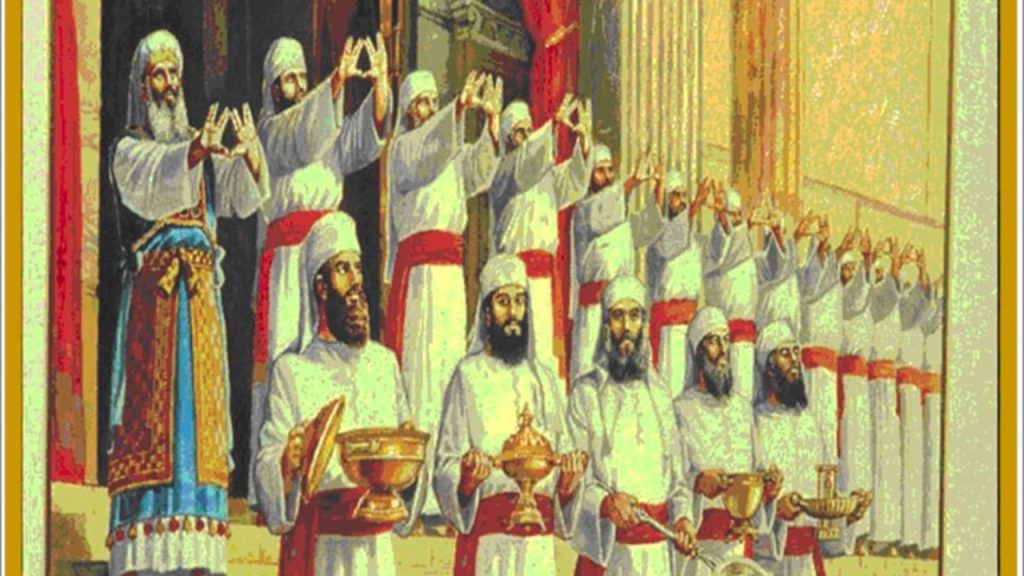
#####
This blog article was inspired by chabbad.org

